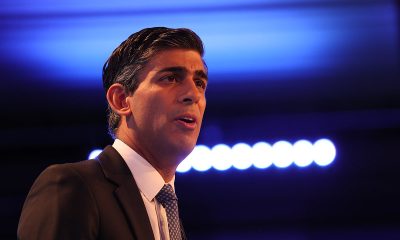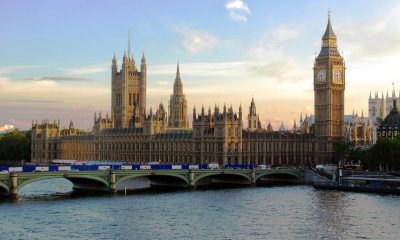Canada News
Liberals announce advisory board to quickly choose new independent senators

Senate of Canada
(Photo from Wikipedia)
OTTAWA—The Trudeau government unveiled Thursday its plan for transforming the Senate into an independent, non-partisan chamber—the first major reform to the scandal-plagued upper house in 50 years and arguably the biggest change since its inception in 1867.
Democratic Institutions Minister Maryam Monsef announced the creation of an arm’s-length advisory board to consult widely and recommend to the prime minister a short list of five merit-based nominees to fill each vacancy in the Senate.
She also released the criteria the advisory board will use to assess potential candidates. Among other things, they will need to have a record of achievement and public service, show integrity, understand the role of the Senate and demonstrate an ability to contribute to the work of the Senate in an independent and non-partisan manner. However, past partisan activities will not automatically disqualify someone from being nominated.
As well, the board is instructed to consider nominees “with a view to achieving gender balance” and to give priority consideration to nominees who represent indigenous people, linguistic, ethnic and other minority communities.
“I believe this new process will immediately begin to restore the confidence of Canadians in an institution that plays a vital role in our democracy,” Monsef said.
“It brings real change to the Senate for the first time in decades.”
The new appointment process was denounced, however, by a number of Senate critics who favour abolition of the chamber or more dramatic reforms, like turning it into an elected chamber. Among the critics was British Columbia Premier Christy Clark, who said the Senate needs to be “fixed or folded” and declared that her province will not participate in the new process.
However, Monsef said the beauty of the new process is that is it doesn’t require a constitutional amendment. It thus avoids the rock on which multiple attempts to reform the Senate over the decades have foundered: the lack of provincial consensus. Provinces will be invited to participate but their involvement is not required.
The advisory board will consist of three federal members and two ad-hoc members from the province in which each vacancy occurs. Monsef said the members will be named by the end of the year.
Initially, the board will be tasked with recommending nominees to fill five vacancies in the provinces that are currently most under-represented in the Senate: two from Ontario, two from Manitoba and one from Quebec. Those are to be filled by early next year, after the board consults “broadly” with local community groups, aboriginal groups, elected leaders and others.
Another 17 vacancies are to be filled by the end of 2016. For those appointments and all others in future, the board’s consultation process will be expanded, including allowing individual Canadians to apply for a Senate appointment.
Government House leader Dominic LeBlanc said one of the first five new senators will be named as the government’s representative in the Senate. That role, heretofore known as the government leader in the Senate, is necessary under existing Senate rules in order to introduce government bills in the chamber and shepherd them through the legislative process.
All the rules governing the Senate are geared to having a governing party caucus and an opposition party caucus. It will be up to the Senate itself to eventually rewrite its rules to reflect the more non-partisan nature of the chamber envisioned by Prime Minister Justin Trudeau, LeBlanc said.
In the meantime, however, Trudeau has appointed Sen. George Furey, a Liberal, to be the new speaker. Furey replaces Conservative Leo Housakos.
Trudeau started the process toward a less partisan Senate two years ago when he removed all senators, including Furey, from the Liberal caucus. They have been sitting as independent Liberals since then.
Trudeau maintains that partisanship has eroded the Senate’s intended role as an independent chamber of sober second thought. And at least two Conservative senators seem to agree with him.
Sen. Jacques Demers announced Thursday that he is quitting the Conservative caucus—the second Tory senator in two weeks to decide to sit as an independent. He’s following the lead of Sen. John Wallace.
Demers said he was uncomfortable with some of the machinations involved in the Senate expenses scandal and chafed at having to vote the Conservative party line all the time.
“When you’re on a team, you have to vote for the team,” the former NHL coach said, adding that his new independence will give him more freedom to champion issues near to his heart, like literacy.
Trudeau’s plan represents the first significant change to the Senate since 1965, when mandatory retirement at age 75 was imposed on senators, who had been given lifetime appointments until then.
Almost from the moment it was created, there have been moves to reform the Senate, including campaigns to transform it into an elected chamber or into a house of the provinces or to abolish it altogether. None has ever managed to achieve a consensus among the provinces.
Manitoba Premier Greg Selinger said his province will not boycott the new process, even though it continues to believe the Senate should be abolished.
“We’ve always felt the Senate was an unnecessary part of the governing structure of this country. But … we want to make sure there is somebody there that can represent Manitoba’s interests.”
Conservative democratic reform critic Scott Reid said the new process “simply creates an unelected, appointed body to recommend unelected, appointed senators.”
Similarly, NDP democratic reform critic Nathan Cullen, whose party advocates abolition, said Trudeau’s new process “papers over some of the fundamental problems with the Senate.”
“It remains unelected, unaccountable and under investigation.”





















